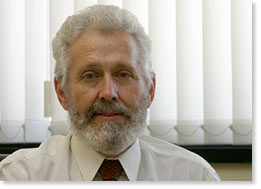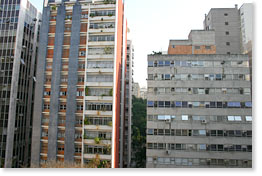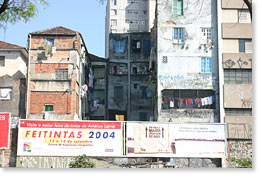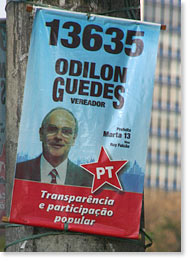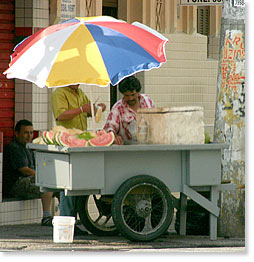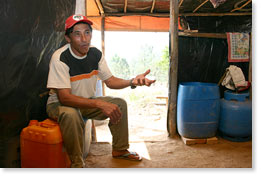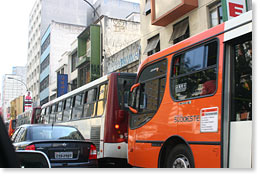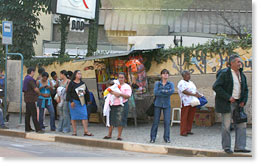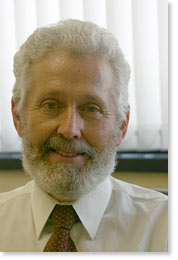|
Interview with Oded Grajew Initiator and Secretariat Member of the World Social Forum Founder of the Ethos Institute for Business and Social Responsibility “Another World is Possible” Social responsibility: rules for being on the market São Paulo, Brazil
The social responsibility of business In Motion Magazine: Please tell me the story of the beginning of the World Social Forum? Oded Grajew: I am a former businessman. I had a toy business. I was a toy manufacturer. I was president of the Toy Manufacturers Association of Brazil. I was always trying to have some social impact and was very interested in political issues and social issues in my business and then as a business leader. In the Brazilian Association of Toy Manufacturers I created a foundation for children’s rights that today has the participation of about 2,500 companies working for children’s rights and having an impact on more than one million children. I participated, was leader, in some political movement in Brazil of business. I was making the links, the bridges, between the Workers Party in Brazil and the business sector -- supporting Workers Party candidates and Lula (Luis Ignacio da Silva, now president of Brazil) for many years. I am his personal friend, since 20 years. I was always looking for what is happening and how we can change the social and environmental situation of the world. Trying to mobilize the business sector of the base. Today, the Ethos Institute is six years old. It has the participation of about 900 companies working for social responsibility and representing, more or less, two percent of Brazilian GDP (Gross Domestic Product). I tried for some time to introduce social responsibility in the World Economic Forum, some social agenda. But, having seen a big resistance to changing the agenda of the World Economic Forum, I was on holidays in Paris, in the year 2000, with my wife Marta. My holidays are to reflect, to read, to participate, like a sabbatical, to have some new ideas and to reflect about things in my life, and so on. And it was the time of the World Economic Forum. It was very difficult for me to read newspapers and to see what the newspapers were saying about the World Economic Forum. That “Now we are in the right way.” That “The world knows what is the model that we need.” “Looking at the world as a big market.” “Looking to people as consumers.” This type of vision expressed by the World Economic Forum, having a big space in the media, it was very difficult for me to support it. Then, one day, in the hotel in Paris, I was thinking, “What can we do against this?” because I know we can have an alternative, another globalization, other proposals. We must show to people that another globalization is possible. Another world is possible when you make the first step the social, not the economic. The economic as a tool for the social; not the people being a tool for the economic. Always in my head, this is my way to see things: always trying to look to both sides of things. Not one vision, but always having two visions for anything, at a minimum. Then I had the idea. Why not create the World Social Forum, as we have the World Economic Forum, speaking about the people in the world? Why not have the World Social Forum -- the social is more important than the economic -- to have a space to show that we can have an alternative? We have choice. This is not the only way you can see the world, globalization. We have another way to see it. And, at the same time, force people to look, to make a choice. What is your choice? What is your vision of the world? To show people that you have an alternative. To make it, at the same time, for the people to make a comparison between both. To have a space to make people who have the same vision to be together and to join forces, strengthen the movement. I was in the room with my wife and I said, “Marta, what do you think about this? I had the idea … . I was thinking … .” She was preparing to go out. “What do you think about it?” She said, “It’s a crazy but beautiful idea.” And then I began to check it. I had a friend; his name is Chico (Francisco) Whitaker. He is a long-time social leader. He was exiled during the (Brazilian) dictatorship, in Paris. He has a daughter with a house in Paris. He was with his wife in Paris at the same time and I called him by phone and I said, “Chico, I have an idea about a World Social Forum at the same time as the World Economic Forum. What do you think about it?” And he said, “This is a very, very good idea. A wonderful idea.” So I told him, “Let’s speak with our friend, Bernard Cassen.” He is the editor of Le Monde Diplomatique, and also a founder, a president of ATTAC (the Association for the Taxation of Financial Transactions for the Aid of Citizens). ATTAC is a social movement in Europe for another globalization. It is an association. The main issue of ATTAC is to introduce a tax on financial transactions to fund social ideas. It is a big organization in France and Europe. It began in France and has relations with other international movements. We called him and me and my wife and Chico and his wife, Estella, went to the office of Bernard Cassen and exposed the idea. Bernard found it a good idea. Then we began to discuss where. It was Bernard who said, “Maybe in Brazil. Maybe in Porto Alegre.” He knows Brazil. “Because Brazil is one of the countries which suffers with this kind of globalization and Porto Alegre has a history of mayors introducing another kind of policy, with a participatory budget, with popular participation, changing priorities for more social and popular goals. I said, “OK, we will come to Brazil and see if it is possible and how we can, step by step, advance this idea.” Then I came to Brazil. I called the governor of Rio Grande Do Sul and the mayor of Porto Alegre and I told the idea and I said, “We are planning to make it in Porto Alegre. It will not be a government event. It will be civil society, but with your hospitality.” And I make a joke with the mayor, “Porto Alegre is not a very known city in the world, but if we succeed Porto Alegre will be very famous and you will no more have to explain ‘Where is Porto Alegre? Is it in Argentina?’” Then, in one of the meeting rooms here, I called six other friends. Chico Whitaker is for the Catholic Church movement, so (to add to that) I called people from the social movements, the NGO (non-governmental organizations) movement, the MST (Movimento dos Trabalhadores Rurais Sem Terra -- Landless Workers' Movement), and the human rights movement. Six people from six organizations, Chico Whitaker for the Catholic movement, and me for the business sector. And I told them the idea. Then, we went to Porto Alegre to see the situation. I went to the Ford Foundation for money, for the first secretariat. Half of the money we had in Brazil, and then I went to New York to speak with them to have more money to establish the secretariat. In June, we launched the international movement officially in Geneva. There was a meeting of civil society, parallel to the meeting of the U.N., that was to evaluate the five years of the social commitment that the U.N. made to human rights in Copenhagen. In January of 2001 we realized the first World Social Forum. In Motion Magazine: Were you surprised at how many people showed up? Oded Grajew: Yes, yes. In Motion Magazine: How many did show up? Oded Grajew: The first year it was sixty thousand people from 120 countries and about 2,000 organizations. We had about 800 conferences, workshops. The social dimension of globalization In Motion Magazine: Do you think it was the perfect time in history to do it? Oded Grajew: Not too late. (Though) too late for many people who suffered all these years from this kind of globalization. For example: we tried to avoid war; we tried to avoid environmental degradation. Or tried to move the social agenda of people in government. As you know, the U.N. made a report about globalization, about all these years of this kind of globalization where you put forward some ideas, such as the free market, the deregulation of national markets, the Washington Consensus. And we have the results of this. This is a very interesting report of the U.N. made by the World Commission on the Social Dimension of Globalization. We can see how the market, and financial transactions, and economic transactions happened. (The report has) a lot of numbers here about business, and, on the other side, you have a big degradation of employment, an increasing of poverty, an increasing distance between rich and poor, a very big environmental degradation, in violence. Is it late? I would like to have had it thirty years ago. Maybe the world would be another kind of place. But it is always time to make it. In Motion Magazine: What is social responsibility for a business, a corporation, and what is social responsibility for a landless worker? How do they compare? Or are they the same thing? Oded Grajew: When we here speak about social responsibility, the idea that we have always tried to make in our life is always we are political beings, we can do anything in many ways. We can organize business or social organizations, make the management of any organization, in many ways. Conduct our life in many ways. What we understand by social responsibility is one of the ways to make things. And what is this way? It is the way you maximize the positive impact that you have, and can have, on the life of people that you impact in your work. For business, the impact on the life of people that work in the business -- the consumers, suppliers, investors, the community, the environment, the next generations, the government -- each decision, each policy must have a positive impact on the life of people. This is the goal. But this is the same for any kind of organization. It is the same for unions. It is the same for social movements, for the MST, NGOs, or government. Everybody has an impact on people. Everybody. Not only business. Unions have employees. How do they treat the employees? Unions buy products. From whom do they buy products? Unions have pension funds, for example. Where are they investing this money? In what kind of companies? And so on. For this reason, I think in the United States this movement for socially responsible investment is growing because people are asking, “Where are we investing our money?” This is the same for us individuals. We also have impacts and can have choice. How to make things. This is the idea. Companies and governments depend on people In Motion Magazine: A lot of the large corporations have a pretty bad track record. Is it the strength of the movements, such as those in the World Social Forum, that is going to make them change? How do you see the change happening? Oded Grajew: No, the change will happen with people. Everyday, more, you have power and income becoming very concentrated in a few people and a few organizations. You have the majority of the population exploited in a very bad situation. How is this possible? If someone came from the moon, he would ask, “How is this possible?” -- because all these people, who don’t have many ideas on what is happening, have difficulty … to act and to be together -- to put everyone together to change the situation. History is full of these examples. Companies and governments depend on people. A company without consumers will go into bankruptcy. And politics without votes will go out of power. This is the idea that I bring, and some other people, but I think people do not very well understand this. People can change the behavior of companies and governments. For example, when people decide, unions and so on, only to buy products and services from some kinds of companies this will change all the business. Today, this morning, we launched this publication, the Commitment of Business with Women. When women will decide, as a big consumer, only to buy products from businesses that have this list of ten kinds of behavior, all the companies will change their behavior because they will not want to lose consumers. They live for the consumers. Unions also. Pension funds can use the power of investors and say, “We are only buying products from these companies,” or “We are only investing money in these companies.” And so on and so on. This will change behavior. Maybe companies are changing, are more socially responsible, because they know that by changing their behavior they will have the support of people. They need the support of people, the support of consumers, the support of employees, the support of community. Introducing rules of social responsibility means market, government only buying products from companies that have fulfilled some commitments. Rules for being on the market. To have a socially responsible market, socially responsible trade. In Motion Magazine: Have you seen progress? Oded Grajew: Yes, I see progress and I also see no progress. Here, in Brazil, I see a lot of progress with companies. I see progress in Europe. I see progress in some companies in the United States. I see progress in the investors. I see progress in the suppliers. I see progress in the consumers’ associations that are introducing these kinds of things. I see progress. I see government putting these conditions on suppliers, who supply the government. I made the same speech to Kofi Annan, the general secretary, because the U.N. has a program, a global compact, trying to mobilize the business sector to have socially responsible management. I told him, “The first step that you must do is to introduce it into the U.N., as an organization -- internally -- with the suppliers and the pension fund. I also told him that every time that he meets with me I will ask him again if he is doing it because this is the best way to have legitimacy. The secretary general told this to all the U.N. agencies and they are now changing internally -- suppliers and pension funds. In Motion Magazine: When did he do that? Oded Grajew: In June. I have a copy of this. I see progress. In war people are dying for economic reasons In Motion Magazine: And you said you saw negative progress also? Oded Grajew: Yes. More money in politics. Putting economic power in politics -- this is a big pressure on public policies. For example, war. War in my opinion is not for democracy. This war, for example, in Iraq and Afghanistan: if it is for democracy you have a lot of war to make. I don’t believe in war as a way for solution of conflict. But, if you want to make war … . You have so many countries that have no democracy but they have not oil. Or they are not interesting for business. Or they are not a threat. You have an ally in Pakistan but you make a war in Afghanistan. You have an ally in Saudi Arabia, which is not a democracy, and so on. In war people are dying for economic reasons. This costs the lives of people. This is not progress. On the contrary. This is a threat for democracy when you need money to be elected. You have so much economic power. This is a threat to democracy. Participatory democracy in an organized way In Motion Magazine: One of the interviews I did with FETRAF in Chapeco was with a youth leader. She was saying that democracy is a lot more than just voting. I was asking about it because in many ways they are refusing to just have their farms attached to these large corporations. They are developing their own businesses. Adding value to their own production. Running a separate, almost autonomous way of life. They see that as more of a basis for developing a real democracy. What do you think about that? Oded Grajew: Citizenship is 24 hours per day. Certainly democracy is not only to vote and to expect someone to represent you and to do things. It is always participation in the public life. Public life is not only government. It is, “What are our common interests?” Practicing it in your day-by-day life, in your organization, in your community. Influencing public policies. Ethos. What is Ethos? It is democracy, participatory democracy in an organized way. All these social movements: it is participatory democracy fighting for common goals and for common interests. And it is practicing it every day. Voting is one (aspect). But how to vote? What is the process? What is Congress doing? What is the government doing? What is the budget? How to influence? How to act? Now we are re-building Brazilian democracy In Motion Magazine: The role of the U.S. in Brazil’s history is huge. Even down to the dictatura (the Brazilian military dictatorship, 1964-1984). Or U.S. corporations. I’m told that Phillip Morris is given subsidies by the government, which they then use to pay Brazilian farmers. It’s free tobacco for Phillip Morris. Can you talk a little about the development of Brazil over the last forty years and the sort of movements that have developed? The relationship with the U.S.? Oded Grajew: I don’t like to generalize because you have in this relationship advantages, important things for Brazil, and other very bad things. You have organizations in the United States and unions in the United States that give a big contribution to Brazilian social and political life. Helping, supporting unions, social movements. Funding human rights movements. You have also U.S. companies that came here and brought a lot of benefit for our society. Bringing another kind of relationship with employees. Bringing the culture of salary. Employees’ conditions. Much bigger than it was in Brazil, in reference to other Brazilian companies. But on the other hand, you have tobacco, and other companies that came here only to have profit and to send it back to the United States. For example, they have a big profit outside of the United States but their philanthropy is put in the United States. And the role of the U.S. government in the dictatorship is public. We know from the transcription of dialogue between (U.S. President) Kennedy and the ambassador here. It is public. They spoke openly about the support of the military coup in Brazil. The need to support it in Brazil was published in Brazil newspapers: the transcriptions of dialogue supporting the installation of the dictatorship in Brazil and the big support all this time to Brazil’s dictatorship. Training military in how to torture and how to repress social movement. This is public. And it is not only Brazil -- Argentina, Chile, and so on. This was very bad for all Latin America. We live until today with this kind of heritage, of having so long dictatorship. Destroying our democracy and our institutions. And now we are rebuilding Brazilian democracy. We believe in social movement, in the World Social Forum, in democracy, in plain democracy. Participatory democracy in all the life of the country is a way to have social justice and to have peace. This was very bad for all Brazil. Not only Brazil, Latin America also. But we have a very positive contribution, as I told you, with other sectors of U.S. society. In Motion Magazine: What else would you like to say that you think is important that I haven’t touched on? Oded Grajew: What is important about this movement, the World Social Forum, is it is not that people are against globalization. This was the first idea, “We are against globalization”. That’s like to be against the sun in the morning. But another kind of globalization. What is important is to see what kind of world we will have if we continue to live in the same way that we live today. It can be the final step of humanity. For example, environmental issues. We can have the end of human beings because we do not have the conditions to live on this planet. This is a result of human action. And human action can change if we want to do it. This is a very big threat to all of us. It will be very fatal to our next generation of children. It is in our door this big tragedy that we have in front of us, global warming, this kind of degradation of the planet that we are doing. The negative, bad image of the United States On the other side, something that worries me is the negative, bad image that the United States is having around the world. And this is growing. It is a confusion between government and people. I think that there must be bigger reflection in the United States about what is happening. I remember here in Brazil, and around the world, in many countries, American culture, American people were looked at with admiration. It was a reference for many people, for business people. But now we are going to a polarization because the U.S. is being seen around the world as a country, a government -- not to confuse that -- that is destroying the world and only thinks about the specific and very concentrated interests of some sectors, business sectors, in the United States. Linkage to arms, oil, and so on. I was talking with some government officials in the United States and they have no idea what is happening. They are not understanding exactly how big is this danger of polarization. I can tell you, here in Brazil, for example the business sector, this was a sector very tied to the United States, favorably. People wanted to go to the United States, Disney World and so on, and to do business. But today if you make a research in Brazil, Latin America, other countries, 90% of the business people, 95%, are against what the American government is doing outside of the United States. This is something that must be reflected about. I don’t like it because it is leading to a polarization and to generalization as to confusion between government, people, country. Published in In Motion Magazine December 19, 2004 Also see:
|
||||||||||||||||||||||||||||||||||||||
If you have any thoughts on this or would like to contribute to an ongoing discussion in the  What is New? || Affirmative Action || Art Changes || Autonomy: Chiapas - California || Community Images || Education Rights || E-mail, Opinions and Discussion || En español || Essays from Ireland || Global Eyes || Healthcare || Human Rights/Civil Rights || Piri Thomas || Photo of the Week || QA: Interviews || Region || Rural America || Search || Donate || To be notified of new articles || Survey || In Motion Magazine's Store || In Motion Magazine Staff || In Unity Book of Photos || Links Around The World NPC Productions Copyright © 1995-2018 NPC Productions as a compilation. All Rights Reserved. |


